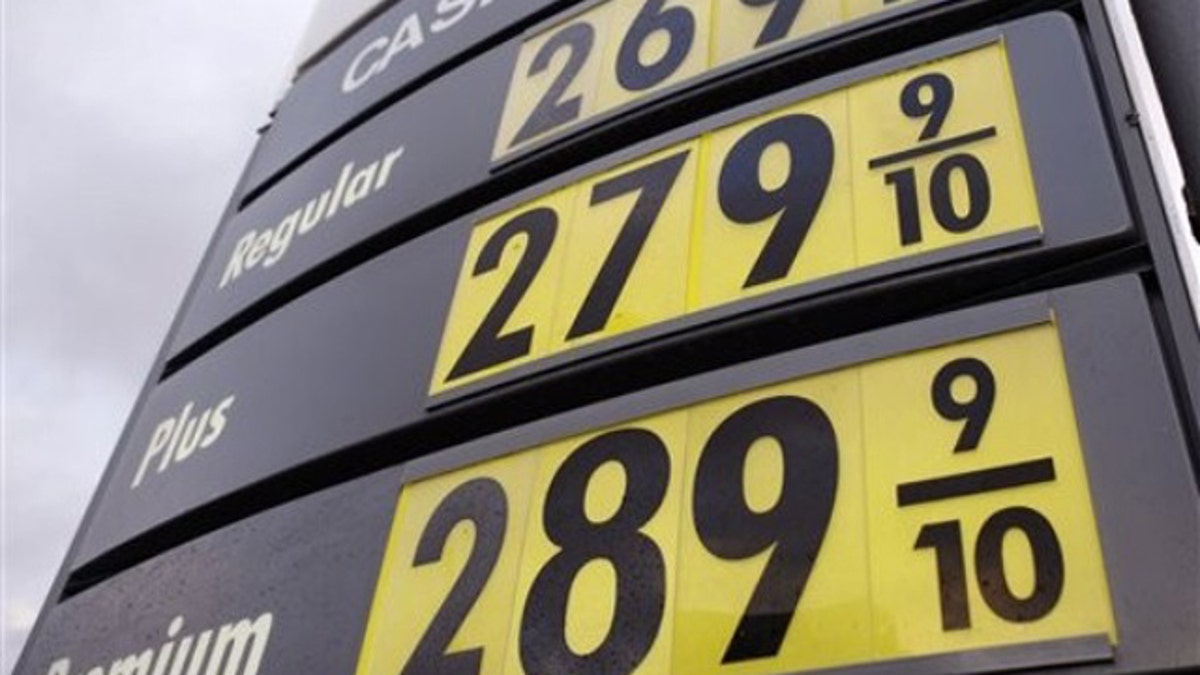
In this Dec. 28, 2009, photo, gasoline prices are posted at a Shell service station in Boston. (AP Photo)
Two former transportation secretaries who recently co-chaired a panel that proposes gas tax hikes and user fees to pay for government transportation projects joined President Obama Monday as he called for a $50 billion immediate investment in roads, rails and runways.
And while the president has not endorsed the proposals by ex-officials Norm Mineta and Samuel Skinner, some industry experts insist gas prices will have to rise to pay for the grand plans.
"These reforms and innovations will not be cheap," said AAA President Robert Darbelnet. "All funding options must be on the table -- including an increase in the federal gasoline tax."
The current federal gas tax, which has remained unchanged since 1993, is 18.4 cents per gallon. Combined with state and other taxes, Americans pay an average of 48 cents extra on every gallon of gasoline -- any increase in the federal tax, based on proposals floated in the past, could easily push the price of regular gas to $3 a gallon.
In an election year, the Obama administration is not talking about the gas tax. A White House official told FoxNews.com the administration wants to fund the $50 billion investment -- a down payment on a broader six-year transportation program -- by closing tax loopholes for oil and gas companies and has not proposed any more fuel taxes.
But some say the kinds of investments the federal government is looking at, short- and long-term, may require a tax increase.
Jill Ingrassia, managing director of government relations and traffic safety advocacy at AAA, told FoxNews.com that the tax loopholes Obama talks about closing might not yield enough.
"I think we've closed a lot of those loopholes in the last two (transportation bills). I don't know if there's a lot more to be gained in that area," she said.
Though AAA is not proposing a specific tax plan, Ingrassia estimated that the nearly $500 billion, six-year transportation budget being drafted in the House Transportation Committee would require about a 25-cent-per-gallon gas tax increase to fund it.
"We have come to the conclusion after much discussion that a gas tax increase likely is going to be necessary going forward," she said.
The reason analysts say a fuel tax may be necessary is that the Highway Trust Fund, the federal account that uses fuel tax revenue to pay for highway maintenance, has for the past several years required infusions from other accounts. In other words, the trust fund can't survive anymore on fuel taxes alone -- at least not at the current rates.
Prominent federal studies over the past several years have drawn this conclusion and, in turn, called for a gas tax hike. The National Surface Transportation Policy and Revenue Study Commission in 2008 said federal fuel taxes should rise by up to 40 cents per gallon over five years. The National Commission on Surface Transportation Infrastructure Financing called for a 10-cent increase in a 2009 report.
In the report released last week, the panel co-chaired by Mineta and Skinner suggested raising the fuel tax in the short-term and then instituting a system that charges Americans for every mile they drive in the long-term.
The report estimated that the "gap" between what the federal government has and what the federal government needs for transportation projects falls somewhere between $134 billion and $262 billion a year.
Without commenting on the contents, Obama touted their report Monday as a "call to action demanding a fundamental overhaul of how America approaches funding and building our infrastructure."
Tad DeHaven, a budget analyst with the Cato Institute, said it'll be politically tricky to talk about the gas tax in the current environment, but predicted there would be a post-election push to do so, even if not by Obama.
"I think there'll be a massive push for a gas tax increase," he said. "That's not going to be anything that's going to come up before November, but certainly after November it's going to be discussed."
DeHaven, though, argued for more private industry involvement, claiming that the gas tax has only served to finance a federal "slush fund." He said that part of the problem contributing to the trust fund's red ink is that lawmakers peel away highway dollars for non-highway programs like mass transit, bicycle paths, beautification projects and earmarks.
A Treasury Department report released Monday stressed the possibility of private investment as part of the country's broader transportation vision. The report noted "there is currently very little direct private investment" in America's highways and said that a proposed "National Infrastructure Bank" could set the stage for "greater private sector co-investment in infrastructure projects."
Obama did not go into detail Monday about how his transportation goals could be financed, saying only that it "will be fully paid for" and will not add to the deficit. But he stressed his plan as an administration priority and said the investment is critical for America to keep its competitive edge.
"We invest less than half of what Russia does in their infrastructure. ... Everywhere else, they're thinking big," he said. "We can no longer afford to sit still."




